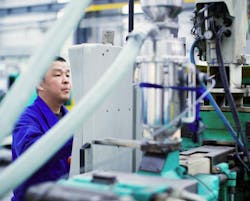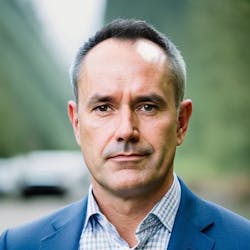By Jennifer Ramsay
Circular CEO Ian Arthurs’ 20 years in tech has included stints at Google, AirBnB, and TaskRabbit. Ikea’s 2017 acquisition of TaskRabbit gradually led him to the intersection of technology and sustainability and the issues manufacturers face in the green transition. Circular was founded in 2021 as a digital platform to connect the buyers and suppliers of recycled plastics by providing real-time data on price, availability and product specs.
Q: How did you find all these companies that supply this kind of material?
We can send these email lists or whatever it may be and ask [suppliers and buyers] to contribute their in-depth information to have an updated view of what they sell. It becomes a cycle when you get buyers, these big companies that are spending, on average, $5 million per order every year, then that helps us to say, “Hey, these six sellers are actually relevant for you. Give us more information to provide a custom quote,” and then that generates more and more data.
Typically, the data is in a technical data sheet of KPIs and test scores and characteristics of the material. All that stuff is standardized and normalized into code that we can search. We were the first folks to create not only the database, but all of the KPI data behind it, and it's going to be an ongoing journey.
When we reach out to suppliers, they’re excited that we can give them help with sales because they need help with sales right now. The buyers are excited because they can access data in ways that we’ve never done before.
Q: What has been one of the biggest roadblocks to connect these buyers and suppliers and maybe even in sustainable manufacturing as a whole?
A: So a buyer, a large manufacturer, really wants to know they can produce something at a predictable price over time and have a stable supply chain, but the market that exists today for recycled plastic doesn’t provide it. The way to help navigate that, to me, is to provide information so you can de-risk all of those things.
The biggest blocker is multiple small things, and if we can give them information to navigate the market in a much easier way, then we can actually get the buyers to commit more dollars. Once the dollars are committed, the recyclers can recycle more and we get the wheel going. But it all starts with, in my opinion, creating a way for manufacturers to find what they need in a predictable way. The incumbent model is this: Pick up a phone and dial some people and figure it out. It’s completely relationship-driven. Which isn’t, as you can imagine, efficient.
Q: How long before the plastics industry is self-sustaining, where there’s basically little to no new plastic being created?
A: I wish I could consult my magic ball and we could find a good timeline on that. What I can do is tell you some of the milestones on the path. It’s going to be a generation at least. The path to get there starts with consumers saying, “I am not willing to accept the fact that I’m buying something that’s going to be discarded and not recycled. I want to buy something that is sustainable.”
There’s also pressure on governments to create regulation, and what’s happening now is regulations are kicking in from 2025 to 2030. You’re going to start to see this movement of the adoption of PCR — post-consumer recycled — plastic, which was on this slow track, start kicking off. If you take a look at European regulations and U.S. regulations in packaging and automobiles, and a number of others that are heavy users of plastic, by 2030 it ramps up.
So, 2025 to 2030 is when we’re going to start to see real change. Then from 2030 to 2040 is when we think it’s going to really tip into the mainstream. I’m not kidding when I think this is a generational change. I like to think, by the time my kids are having kids, the notion of buying something that is completely made out of virgin materials is going to be weird to them.
Q: Going back to Circular: You recently got significant funding, and you’ve talked about eventually getting into other sorts of materials, but what’s next in the short term?
A: It’s about hiring great people to further our data platform; working on AI, working with suppliers directly to get all that information that I talked about and then putting it into a usable format so that big manufacturers can search for the material they want.
The next wave is geographic growth. We’re spread throughout the United States and I forecast the need to have some presence in Europe and potentially in Asia as well, due to the time difference.
Then also expansion in materials; recycled plastic is our start. We’re going to add new materials, all the glass, aluminum, municipal solid waste stuff for sure. There’s other things as well that we are just starting to get to, like bioplastics, chemically recycled plastics and new materials that are coming out of labs.
We need really great talent who can build the tech but also can help understand industry, people who have run manufacturing operations before that can tell us how this stuff really works, and then also material scientists. We have a great group of consultants and advisers who help us with those things, and we need more of them in our company as we grow.
About the Author
Jennifer Ramsay
Editor-at-Large, Endeavor Business Media
Editor-At-Large Jennifer Ramsay is in charge of multiple of Endeavor Business Media’s Market Moves newsletters. She also reports on the latest in the electric vehicle and clean energy spaces for IndustryWeek, FleetOwner, and EnergyTech. She has experience in various facets of multimedia journalism.

